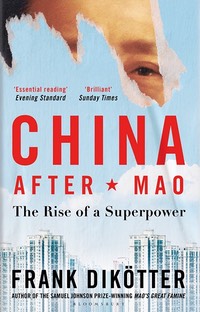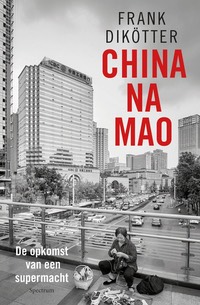Through decades of direct experience of the People's Republic combined with extraordinary access to hundreds of hitherto unseen documents in communist party archives, the author of The People's Trilogy offers a riveting account of China's rise from the disaster of the Cultural Revolution. He takes us inside the country's unprecedented four-decade economic transformation ― from rural villages to industrial metropoles and elite party conclaves ― that vaulted the nation from 126t largest economy in the world to second largest.
A historian at the pinnacle of his field, Dikötter challenges much of what we think we know about how this happened. Casting aside the image of a society marching unwaveringly toward growth, in lockstep to the beat of the party drum, he recounts instead a fascinating tale of contradictions, illusions, and palace intrigue, of disasters narrowly averted, shadow banking, anti-corruption purges, and extreme state wealth existing alongside everyday poverty. He examines China's navigation of the 2008 financial crash, its increasing hostility towards perceived Western interference, and its development into a thoroughly entrenched dictatorship with a sprawling security apparatus and the most sophisticated surveillance system in the world. As this magisterial book makes clear, the communist party's goal was never to join the democratic world, but to resist it ― and ultimately defeat it.
Bloomsbury, September 2022, pp. 416
Translations in Dutch, French, German, Italian, Portuguese, Spanish, Hungarian, Mandarin and Korean.
Translation, Film/TV: Andrew Wylie
Reviews:
'A richly informative, disquieting history.’ - Kirkus starred review
'Dikötter's highly-readable primer provides a valuable corrective ... Helps puncture the image of China's inexorable economic rise.' ― New Statesman
'A clear-eyed and detailed account ... Dikötter has been mining Chinese primary sources for decades.' ― Observer
'A revolutionary book . . . Breaking with the bland orthodoxy peddled in some of our finest universities, Dikötter says that China today is a Leviathan where a party, fascist in all but name, controls society . Dikötter marshals a daunting array of statistics and documents . . . Historians such as Dikötter are there to warn.' ― Michael Sheridan, Sunday Times
'Offers a blow-by-blow account of the uneven, reactive and sometimes chaotic course of economic policies . . . China After Mao provides an important corrective to the conventional view of China's rise through reform.' ― Financial Times


